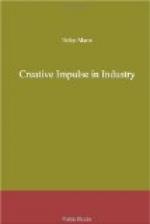Although political socialism may be the economic sequel of private capital there is no foundation for the belief that it will of itself induce creative effort or stimulate creative impulse. The faith back of the socialist movement that desirable attributes like the creative impulse, which men potentially possess, will begin to operate automatically and universally as soon as there is sufficient leisure and food for general consumption, is blind and historically unwarranted. The signs are that a socialist state would lean exclusively on the consumption desire for production results, just as the present system of business now does. Neither fat incomes nor large leisure have furnished the world with its people of genius. In spite of the inhibiting influence of exploitation, they have come, what there are of them, out of intensive application to some matter of moment. Possibly they would come, and more of them, from the work-a-day world under socialism with the inhibiting influence of organized exploitation removed, but more of them would not insure a democracy in industry or elsewhere. Nothing insures that short of a strong emotional impulse, a real intellectual interest in the adventure of productive enterprise.
The creative desire is an incident or a sort of by-product of the economics of socialism as it is of classical economics; neither one nor the other depends on its cultivation. Either is capable of achieving mass production, but neither insures a democratic control of industry, neither provides for growth, for education in the productive process. A democracy of industry requires a people’s sustained interest in the productive enterprise; their interest in the development of technology, the development of markets, and the release of man’s productive energy.
It happens that in machine production and in the division of labor there are emotional and intellectual possibilities which were non-existent in the earlier and simpler methods of production. As power latent in inorganic matter has been freed and applied to common needs, an environment has been evolved, filled with situations incomparably more dramatic than the provincial affairs of detached people and communities. Although this technological subject matter, rich in opportunities for associated adventure and infinite discovery, is not a part of common experience, it exists, and if called out from its isolation for purposes of common experimentation, it is fit matter for making science a vital experience in the productive life of the worker.
Industry under the direction of business will not open up the adventure with its stimulating factors to its subservient labor force, unless it happens that the present methods fail, in time, to carry forward industrial enterprise on a profit-making basis; or unless labor develops the power which springs from desire for creative experience, to undertake the direction and control of industry.




